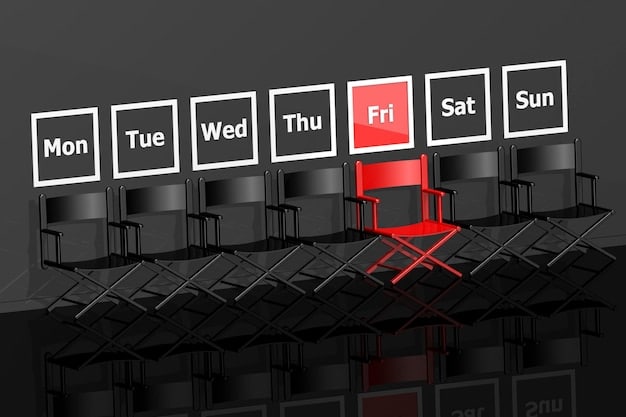Podcast Interview Scheduling: Calendar Optimization for Efficiency

Effective podcast interview scheduling is paramount for maintaining consistent content flow and minimizing logistical hurdles, directly impacting the show’s overall production efficiency and professional reputation.
In the dynamic world of podcasting, securing and coordinating compelling guest interviews is often the backbone of engaging content. Ensuring a smooth, efficient scheduling process for these interactions is not merely a convenience but a strategic imperative. Mastering podcast interview scheduling: optimize your calendar for maximum efficiency is crucial for any creator looking to elevate their show and deliver high-value content consistently to their audience.
The Strategic Importance of Streamlined Scheduling
In the competitive landscape of podcasting, efficiency is king. A well-orchestrated scheduling process for interviews enables podcasters to maintain a consistent release schedule, attract high-caliber guests, and project an image of professionalism. Conversely, disorganized scheduling can lead to missed opportunities, frustration for both hosts and guests, and a decline in content quality. This foundational aspect often goes unaddressed in detail, yet its impact reverberates throughout the entire production pipeline.
Beyond simply avoiding conflicts, strategic scheduling plays a pivotal role in resource allocation. By optimizing your calendar, you free up valuable time that would otherwise be spent on back-and-forth emails, last-minute cancellations, and rescheduling headaches. This reclaimed time can then be reinvested into content creation, promotion, or developing new show segments, amplifying the overall value proposition of your podcast.
Understanding the Impact on Guest Experience
The experience of your guest, from the initial outreach to the final “thank you,” significantly influences their willingness to participate and recommend your show to others. A chaotic scheduling process can leave a negative impression, even before the recording begins. Conversely, a seamless and professional scheduling system conveys respect for their time and expertise.
- First Impressions Count: A clear, concise scheduling link or direct communication establishes a professional tone from the outset.
- Reduces Friction: Streamlined tools eliminate unnecessary back-and-forth, making the process effortless for guests.
- Builds Trust: Respecting a guest’s busy schedule through efficient planning fosters a positive relationship.
Ultimately, a positive guest experience contributes to the word-of-mouth marketing of your podcast, potentially attracting more sought-after interviewees in the future. It’s an often-overlooked aspect of podcast growth that stems directly from effective scheduling.
Minimizing Internal Production Disruptions
Just as guest experience is paramount, the internal impact of scheduling on your production team (or yourself, if you’re a solo podcaster) cannot be overstated. When scheduling is haphazard, it introduces variables that can cascade into broader production delays. Late bookings might mean rushed research, inadequate preparation, or even the need to push back release dates.
Conversely, a well-defined scheduling strategy ensures that all necessary components are in place well in advance. This includes having time for pre-interview research, sending out reminder emails, setting up recording equipment, and coordinating with any co-hosts or producers. By minimizing internal disruptions, you unlock greater creative flow and efficiency across the board.
The strategic importance of streamlined scheduling extends beyond mere convenience; it is a critical component of professional podcast production. It enhances guest experience, minimizes internal production disruptions, and ultimately ensures the consistent delivery of high-quality content that resonates with your audience.

Leveraging Technology for Seamless Scheduling
In today’s digital age, relying on manual email exchanges for interview scheduling is not only inefficient but also prone to errors. The proliferation of powerful scheduling tools has revolutionized the way podcasters can coordinate with guests, offering automation, integration, and convenience that were once unimaginable. Embracing these technological solutions is a cornerstone of optimizing your calendar for maximum efficiency.
These tools range from simple calendar integrations to comprehensive booking platforms designed specifically for appointments. The key is to select a solution that aligns with your workflow, budget, and the specific needs of your podcast. Investing time upfront to research and implement the right technology will yield significant returns in saved time and reduced stress.
Exploring Automated Scheduling Platforms
Automated scheduling platforms are perhaps the most impactful technological advancement for podcast interview scheduling. Services like Calendly, Acuity Scheduling, and SavvyCal allow guests to view your real-time availability and book a slot that works for them, eliminating the endless back-and-forth of traditional methods. They integrate directly with your personal calendar, ensuring no double bookings.
- Real-time Availability: Guests see only the times you are truly free, based on your linked calendars.
- Automated Reminder Emails: Platforms can send out confirmation emails, reminders, and even follow-up messages automatically.
- Time Zone Conversion: Automatically adjusts for different time zones, a critical feature for international guests.
Beyond basic scheduling, many of these platforms offer advanced features such as buffer times between appointments, minimum notice periods for bookings, and custom intake forms to gather pre-interview information from guests. This comprehensive approach ensures that not only is the time booked, but you also have all the necessary context for the interview.
Integrating with Existing Tools for a Unified Workflow
The true power of scheduling technology lies in its ability to integrate seamlessly with your existing podcasting stack. This means connecting your scheduling tool with your communication platforms (like Zoom or Google Meet), CRM systems (if you manage a large guest database), and even project management tools (like Trello or Asana) to track interview progress.
For instance, when a guest books a time slot, the scheduling tool can automatically create a new meeting link in your video conferencing software and add the event to your Google Calendar. This automation reduces manual data entry and minimizes the chance of human error. It creates a unified, efficient workflow that touches every aspect of your podcast production.
Furthermore, consider how your scheduling tool can interact with your email marketing platform. A confirmation email sent via the scheduling tool could include a link to your podcast’s latest episodes or an invite to subscribe to your newsletter, further nurturing the relationship with your guest. Leveraging technology for seamless scheduling isn’t just about booking; it’s about creating an interconnected system that streamlines your entire podcasting operation.
Crafting an Effective Outreach and Follow-Up Strategy
Even the most sophisticated scheduling tools won’t guarantee interviews if your outreach and follow-up strategy is lacking. A well-crafted approach ensures that potential guests are compelled to accept your invitation and that the pre-interview process runs smoothly. This involves personalized communication, clear instructions, and timely reminders to keep everyone on track.
Remember, your outreach is often the first impression a guest has of your podcast. Make it count by demonstrating professionalism, clarity, and genuine interest in their expertise. This foundational step sets the tone for a successful interview and a positive collaboration.
Initial Outreach: Personalization and Clarity
Generic, template-driven outreach emails often end up in spam folders or are quickly dismissed. To stand out, personalize your initial contact. Research your potential guest and reference specific work or insights that resonate with you and your audience. This shows you’ve done your homework and value their unique contribution.
- Personalized Introduction: Mention how you discovered their work and why they are an ideal guest for your show.
- Clear Purpose: State the podcast’s topic, target audience, and the specific value their insights would bring.
- Concise Call to Action: Clearly state what you’re asking them to do (e.g., “Would you be open to a 30-minute interview?”).
- Easy Scheduling Link: Directly include a link to your automated scheduling tool to simplify the booking process.
Keep your initial email concise and to the point. Busy individuals appreciate brevity. Provide all necessary information upfront, but avoid overwhelming them with details they don’t need until they’ve expressed interest. The goal is to pique their interest and make the next step as easy as possible.
Pre-Interview Communications and Reminders
Once a guest has confirmed their availability, the work isn’t over. A series of well-timed pre-interview communications can significantly reduce no-shows and ensure the guest is fully prepared. This sequence of messages should provide all the practical details and helpful tips they might need.
Typically, this sequence begins with a confirmation email immediately after booking, reiterating the date, time (with time zone clearly specified), and the link to the recording session. This should be followed by a primary reminder approximately one week before the interview, and a final, brief reminder 24-48 hours before.
These communications should also include practical information such as:
- Tech Requirements: Recommendations for microphone, internet connection, and quiet environment.
- Interview Topic/Questions: A brief overview of what will be discussed, or even a few specific questions to help them prepare.
- Your Podcast Links: Remind them of your show’s name and where to listen, encouraging them to familiarize themselves with your style.
By proactively providing all necessary information and sending timely reminders, you demonstrate professionalism and reduce anxiety for your guest. This comprehensive approach to outreach and follow-up solidifies the interview appointment and ensures a smoother, more productive recording session, ultimately contributing to optimized podcast interview scheduling and maximum efficiency.
Establishing Clear Guidelines and Expectations
For a truly efficient interview process, proactive communication about expectations and operational guidelines is invaluable. This prevents misunderstandings, reduces last-minute issues, and ensures both host and guest are on the same page well before the recording begins. Setting clear boundaries and providing necessary information upfront fosters a professional and respectful environment.
Clarity in communication demonstrates your professionalism and respect for your guest’s time and expertise. It also helps manage their expectations about the podcast’s format and the flow of the interview, leading to a more natural and engaging conversation.
Preparing Guests for the Interview
Beyond scheduling, helping your guests prepare adequately for the interview can significantly improve the quality of the conversation. Providing them with a clear understanding of the podcast’s format, your recording setup, and what to expect can alleviate any anxiety and encourage them to bring their A-game.
Consider sending a brief “guest guide” or a dedicated section on your website that outlines common questions and best practices. This guide could cover:
- Podcast Format: Explain if it’s a casual chat, a structured interview, or a Q&A session. Mention the estimated interview length.
- Technical Setup: Advise on using a good microphone (if possible), finding a quiet space, and ensuring a stable internet connection.
- Pre-Interview Questions/Topics: Share a brief outline of the key themes or specific questions you plan to ask. While you don’t want canned answers, this helps them gather their thoughts.
- Promotion Information: Ask for their website, social media handles, and any current projects they wish to promote.
This proactive preparation not only benefits the guest but also ensures you get the most valuable content from your time together. A prepared guest is a confident guest, and confidence translates into better on-air performance.
Setting Boundaries and Managing Time Expectations
Time management during the interview itself is just as crucial as scheduling it. Clearly communicating the expected duration of the interview and sticking to it is a sign of professionalism and respect. Guests often have tight schedules, and running over time can be highly inconvenient.
Before the interview begins, briefly reconfirm the expected duration and let the guest know if you’ll give them a warning near the end. For example, “We’re aiming for about 45 minutes, and I’ll give you a 5-minute heads-up before we wrap.”
It’s also essential to establish boundaries regarding post-interview processes. Will there be an editing review? When can they expect the episode to air? Are there any specific actions you need from them postpartum?
For example, you might include in your pre-interview notes:
- “The interview will last approximately 45 minutes, with additional time for pre-show chat and post-show wrap-up.”
- “We aim to release episodes within 2-4 weeks. We’ll notify you once your episode is live.”
- “We’ll handle all editing; no review process is required unless otherwise specified.”
By clearly establishing these guidelines and expectations, you streamline the entire interview process, from initial contact to episode release, preventing potential communication breakdowns and enhancing the overall efficiency of your podcast interview scheduling.
Optimizing Booking Windows and Buffer Times
Strategic calendar management for podcast interviews involves more than simply finding open slots. It requires careful consideration of booking windows, buffer times, and setting realistic availability to prevent overwhelm and maintain the quality of your interviews. Neglecting these elements can lead to burnout, rushed preparations, and a decline in content quality, despite having a full interview calendar.
The goal is not to fill every single available minute with interviews, but to create a sustainable schedule that allows for thorough preparation, engaging conversations, and necessary downtime between commitments. This balanced approach is crucial for long-term podcasting success.
Defining Your Ideal Booking Window
Your “booking window” refers to how far in advance you allow guests to schedule an interview. Setting this appropriately is vital. Allowing bookings too far in advance can lead to more cancellations or reschedules as guests’ schedules change. Allowing bookings too close to the present can mean you don’t have enough time for proper research and preparation.
A typical optimal booking window for podcast interviews might be anywhere from 2 to 6 weeks out. This provides guests with enough flexibility to find a suitable time while giving you sufficient lead time to:
- Conduct Thorough Research: Dig deep into the guest’s background, recent work, and areas of expertise.
- Develop Targeted Questions: Craft insightful questions that go beyond surface-level information.
- Promote the Upcoming Episode: Start building anticipation for the interview on your social channels or newsletter.
- Coordinate with Team Members: If you have co-hosts or producers, ensure everyone is aligned and prepared.
Avoid last-minute bookings unless absolutely necessary. While spontaneity can be exciting, it often compromises the depth and preparation that lead to truly compelling interviews.
Implementing Essential Buffer Times
Buffer times are periods of unscheduled time you intentionally build around your interview slots. They are critical for managing the unpredictable nature of live recordings and preventing one delayed interview from derailing your entire day. Think of them as dedicated spaces for breathing, reviewing, and resetting.
Consider the following types of buffer times:
- Pre-Interview Buffer (15-30 minutes): Use this time to do final tech checks, review your notes, clear your mind, and be fully present when the guest joins. This prevents you from rushing from one task directly into a recording.
- Post-Interview Buffer (15-30 minutes): This is for immediate post-interview tasks – taking notes, logging key timestamps, sending a quick thank you message, or simply decompressing before your next task. It also accounts for interviews that might run slightly over the scheduled time.
- Between Interview Buffer (30-60 minutes if multiple interviews in a day): If you’re conducting back-to-back interviews, a longer buffer between them is essential. This allows for system reboots, stretching, grabbing a drink, and mentally preparing for the next unique conversation.
By optimizing booking windows and diligently implementing buffer times, you create a more resilient and less stressful interview schedule. This disciplined approach to calendar management is a hallmark of efficient podcast interview scheduling: optimize your calendar for maximum efficiency, ensuring high-quality content and a sustainable production pace.
Analyzing and Adapting Your Scheduling Process
Optimizing your podcast interview scheduling is not a one-time setup; it’s an ongoing process of analysis, refinement, and adaptation. What works perfectly for one season might need adjustments for the next, based on guest availability, your show’s growth, or changes in your personal workflow. Regularly reviewing your scheduling methodology is essential for maintaining peak efficiency and preventing bottlenecks.
This continuous improvement mindset allows you to proactively address challenges and leverage new opportunities, ensuring your scheduling remains a strong asset rather than a source of friction in your podcast production.
Gathering Feedback and Identifying Bottlenecks
The best way to understand where your scheduling process can be improved is by gathering feedback. This doesn’t have to be a formal survey; simple, open-ended questions can yield valuable insights. Consider asking guests (and even yourself or your team) about their experience with your scheduling.
Potential questions to consider:
- “Was the booking process clear and easy?”
- “Did you receive all the necessary information in advance?”
- “Was the reminder system helpful?”
- “Was there anything confusing or difficult about finding a time?”
Beyond active feedback, pay attention to recurring issues. Are certain types of guests consistently having trouble booking? Are you frequently running into tech issues that could be mitigated by better pre-interview instructions? Identify these recurring bottlenecks and brainstorm potential solutions. For instance, if guests often miss the time zone conversion, you might need to highlight it more prominently in your communications.
Adjusting for Seasonal Variations and Growth
Podcast audiences and guest availability can fluctuate based on seasonal patterns. For example, guests might be harder to book during major holidays or busy academic seasons. Your podcast’s growth also plays a significant role; as your show gains traction, you might attract more in-demand guests with tighter schedules, requiring even more advanced planning.
Be prepared to adapt your scheduling strategies as these factors change:
- Seasonal Adjustments: If you notice a dip in guest availability during summer or year-end, consider planning “evergreen” content or solo episodes during those times. Alternatively, aim to book high-profile guests well in advance of peak holiday seasons.
- Increased Demand: As your show grows, you might need to expand your available interview slots, delegate more scheduling tasks to a virtual assistant, or invest in more robust scheduling software with advanced features.
- Refining Your Ideal Guest Profile: Your understanding of who makes a great guest will evolve. Continuously refine your outreach to target individuals who are not only knowledgeable but also responsive and easy to schedule.
By actively analyzing your scheduling process, gathering feedback, and being agile enough to adapt to seasonal variations and your podcast’s growth, you ensure that your approach to podcast interview scheduling: optimize your calendar for maximum efficiency remains effective and supportive of your show’s ongoing success. This iterative process is a hallmark of truly optimized and professional podcast production.
The Role of Communication in Preventing Rescheduling Woes
Even with the most streamlined scheduling systems, the reality of dynamic calendars means rescheduling is sometimes inevitable. The key to mitigating its negative impact lies in proactive, clear, and empathetic communication. Poor handling of reschedules can sour relationships with guests and cause significant production delays. However, a well-managed rescheduling process can actually strengthen guest relationships and demonstrate your professionalism.
This section emphasizes that while technology automates the initial setup, human communication and understanding are paramount when plans need to change.
Proactive Communication and Flexibility
When a reschedule becomes necessary, whether initiated by you or the guest, swift and clear communication is crucial. If you need to reschedule, inform the guest as soon as possible, providing a brief explanation (if appropriate, without oversharing) and a direct link to rebook at their convenience. This demonstrates respect for their time and proactive problem-solving.
Similarly, when a guest requests a reschedule, respond promptly and provide options. Avoid making them jump through hoops to find a new slot. Your automated scheduling tool should make this easy for both parties.
- Acknowledge Promptly: Respond to reschedule requests quickly, ideally within the same day.
- Offer Easy Solutions: Direct them back to your scheduling link to pick a new time that works for them.
- Empathy and Understanding: Recognize that schedules change. A polite and understanding tone goes a long way. Phrases like “I completely understand,” or “No problem at all, life happens,” can diffuse potential frustration.
Being flexible and understanding when a guest needs to reschedule builds goodwill. It shows that you value them as a person, not just as an interview subject, which can lead to a more relaxed and open conversation when the interview eventually happens.
Leveraging Automation for Reschedule and Cancellation Management
Many advanced scheduling platforms offer automated features specifically designed to handle reschedules and cancellations gracefully. These features can significantly reduce the manual effort involved and ensure consistency in your communication, even in unexpected situations.
Key automation features to look for:
- Self-Service Rescheduling: Allows guests to reschedule their appointment directly through the same link they used to book, without needing to contact you. This empowers them and saves you time.
- Automated Cancellation Notifications: When an appointment is canceled, the system can automatically send a notification to your calendar and relevant team members, freeing up the slot immediately.
- Customizable Reschedule Confirmations: Send automated emails confirming a rescheduled time, including all the new details, just as you would for an initial booking.
- Cancellation Policies: For highly in-demand guests, you might set up notice periods for cancellations (though this is less common for free podcast interviews).
While automation simplifies the logistics, remember to maintain the human touch. A brief, personalized note from you in addition to the automated messages can reinforce the positive relationship. The smart application of technology combined with empathetic communication is the ultimate strategy for preventing rescheduling woes and maintaining maximum efficiency in your podcast interview scheduling: optimize your calendar for maximum efficiency efforts.

| Key Point | Brief Description |
|---|---|
| 📅 Automated Scheduling | Utilize tools like Calendly to automate bookings, reducing manual effort and time zone errors. |
| ✍️ Clear Communication | Send personalized outreach, detailed pre-interview guides, and timely reminders to guests. |
| ⏱️ Buffer Time Implementation | Build in buffers before, after, and between interviews for prep, debrief, and unexpected delays. |
| 🔄 Continuous Optimization | Regularly review feedback, identify bottlenecks, and adapt your process for seasonal changes and growth. |
Frequently Asked Questions About Podcast Interview Scheduling
To minimize no-shows, use automated scheduling tools that send multiple reminders via email or SMS. Provide all necessary details like date, time (with time zone conversion), and meeting link well in advance. A final reminder 24 hours before the interview is often very effective. Also, ensure your initial communication is clear and professional to set expectations.
Automated scheduling software (e.g. Calendly) automatically detects the guest’s time zone and displays your availability accordingly, eliminating manual calculations and errors. Always explicitly state the time zone when communicating manually, using UTC or specifying both your local time and the guest’s expected local time to avoid confusion.
It’s generally beneficial to send a brief outline of topics or a few key questions. This helps guests prepare, ensuring a more insightful and focused discussion. Avoid sending a full script, as this can lead to rehearsed answers. The goal is to guide them, not to dictate their responses, allowing for natural conversation during the live interview.
Aim for at least 15-30 minutes of buffer time before and after each interview to account for tech setup, last-minute preparations, and debriefing. If you’re conducting multiple interviews on the same day, a longer buffer of 30-60 minutes between full sessions can prevent burnout and allow you to reset your focus for the next guest.
Immediately after booking, send a confirmation email with the interview date, time, and meeting link. Include details about your podcast, what to expect during the interview, and any technical recommendations. This email can also ask for their bio and headshot for promotional purposes, ensuring you have all materials well in advance.
Conclusion
Optimizing your podcast interview scheduling is undoubtedly a cornerstone of efficient podcast production and a critical enabler for consistent content delivery and guest satisfaction. By strategically leveraging automated tools, establishing clear communication protocols, defining realistic booking windows, incorporating essential buffer times, and continuously analyzing your process, you can transform what can often be a logistical headache into a seamless, professional operation. This thoughtful approach not only enhances the guest experience but also frees up valuable time and energy, allowing you to focus on what truly matters: creating compelling, high-quality content that resonates with your audience and elevates your podcast.





